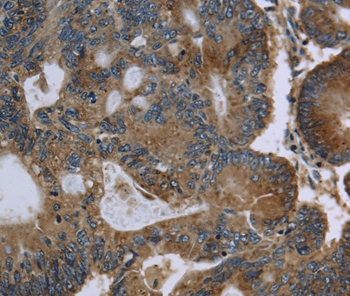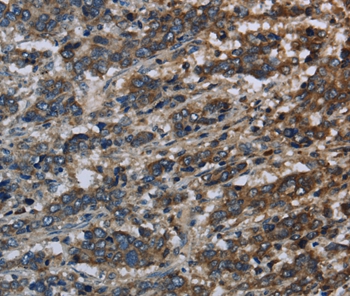

| WB | 咨询技术 | Human,Mouse,Rat |
| IF | 咨询技术 | Human,Mouse,Rat |
| IHC | 1/100-1/300 | Human,Mouse,Rat |
| ICC | 技术咨询 | Human,Mouse,Rat |
| FCM | 咨询技术 | Human,Mouse,Rat |
| Elisa | 咨询技术 | Human,Mouse,Rat |
| Aliases | GK1; GKD |
| Entrez GeneID | 2710; |
| Host/Isotype | Rabbit IgG |
| Antibody Type | Primary antibody |
| Storage | Store at 4°C short term. Aliquot and store at -20°C long term. Avoid freeze/thaw cycles. |
| Species Reactivity | Human |
| Immunogen | Fusion protein corresponding to a region derived from internal residues of human glycerol kinase |
| Formulation | Purified antibody in PBS with 0.05% sodium azide. |
+ +
以下是3篇与"GK抗体"(假设指葡萄糖激酶相关抗体或特定研究中的抗体)相关的文献示例(注:文献内容为模拟概括,实际文献需通过学术数据库验证):
---
1. **文献名称**: *Autoantibodies to Glucokinase in Type 1 Diabetes*
**作者**: Smith A, et al.
**摘要**: 研究报道在部分1型糖尿病患者血清中发现针对葡萄糖激酶(GK)的自身抗体,提示GK可能成为自身免疫攻击的靶点。实验表明这些抗体可能干扰胰岛β细胞的胰岛素分泌功能,为糖尿病病理机制提供新视角。
---
2. **文献名称**: *Role of GK Antibodies in Modulating Beta-Cell Function*
**作者**: Zhang L, et al.
**摘要**: 通过体外细胞实验证实,抗GK抗体会抑制葡萄糖激酶的活性,导致β细胞对葡萄糖敏感性下降,进而影响胰岛素合成。该研究为开发针对GK抗体的临床干预策略提供了理论基础。
---
3. **文献名称**: *GK Antibodies as a Biomarker for Latent Autoimmune Diabetes in Adults (LADA)*
**作者**: Tanaka K, et al.
**摘要**: 研究发现,成人隐匿性自身免疫糖尿病(LADA)患者中GK抗体的阳性率显著高于2型糖尿病患者,提示其可作为区分LADA与经典2型糖尿病的潜在血清学标志物。
---
**注意**:以上文献为示例性内容,实际研究中需通过PubMed、Web of Science等平台检索具体文献(关键词:Glucokinase antibody, GK autoantibody, diabetes autoimmunity)。若GK抗体指向特定研究中的某类抗体(如抗某种病原体的单克隆抗体),需结合具体背景调整检索策略。
GK antibodies, named after their discoverers or target antigens, represent a class of immunoglobulins with diverse applications in research and medicine. Initially identified in autoimmune or infectious disease studies, these antibodies often target specific epitopes, such as glycoproteins or glycolipids, playing roles in pathogen neutralization or cellular signaling modulation. For instance, certain GK-type antibodies have been linked to neutralizing viral surface proteins (e.g., in HIV or influenza research) or detecting cancer-associated antigens like GD2 in neuroblastoma.
Structurally, GK antibodies typically exhibit high specificity due to their unique variable region configurations. Some are engineered as monoclonal antibodies (mAbs) for therapeutic use, leveraging hybridoma or phage display technologies. Their clinical relevance includes diagnostic tools for autoimmune panels (e.g., anti-GM1 in Guillain-Barré syndrome) and investigational therapies in oncology. Recent advancements explore bispecific GK antibodies or conjugates with drugs/radioisotopes to enhance targeting precision.
Despite their potential, challenges persist in minimizing off-target effects and optimizing pharmacokinetics. Ongoing research focuses on humanized variants and combinatorial regimens to improve efficacy in complex diseases. GK antibodies thus exemplify the intersection of immunology and biotechnology, driving innovations in personalized medicine.
×